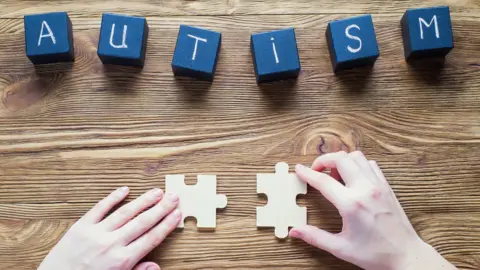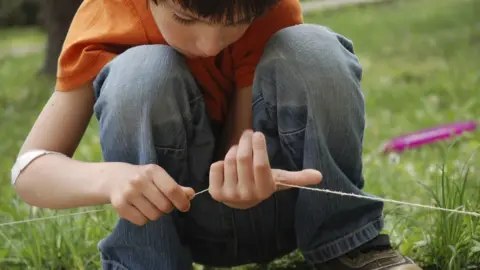'Taboo' autism seen as 'disease' in ethnic communities
 Getty Images
Getty ImagesThe "taboo" subject of autism must be tackled in ethnic minority communities rather than ignored like a "disease", one campaigner has said.
Hazel Lim believes it is almost seen as "contagious" while Race Council Cymru said families cover it up fearing it will affect marriage chances.
The National Autistic Society estimates there are 34,000 autistic people in Wales from all backgrounds.
However, it is thought there could be many more in minority communities.
Autism is a lifelong development disability which cannot be cured and affects how people see, hear and interact with the world.
"Many families with autistic children would prefer not to make it public because it affects your chances of making a good marriage," said Race Council Cymru's chief executive Uzo Iwobi.
"People judge you and the children are often picked on so it's very, very difficult to find Black, Asian and Minority Ethnic families who want to talk about it openly."
Ms Iwobi said parents and grass roots ethnic minority organisations need to be encouraged to talk about it more.
She said otherwise it will "always be a situation that is hidden in plain sight", adding: "We should focus on this issue pertaining to ethnic minority communities because there is a specific need to have those families supported and encouraged to come out and talk about it and seek the help that they so desperately need."
In Swansea, the Chinese Autism Support Group is aiming to improve knowledge and understanding.
It was set up by Hazel Lim, who has an autistic child and a masters degree in the condition.
"In the Chinese culture, autism is like a taboo - nobody even wants to mention it. It's like a disease," she said.
"Even by saying it, it can spread. They feel like it's contagious. I think that's down to the cultural perception."
She said in China it is viewed "very negatively", adding: "People who come to the UK, the Chinese who come here, when their children are diagnosed with autism they feel like that's the end of the world."
Ms Lim said language was the main barrier to overcoming issues, with most of the information available in English.
"They will not go out and ask people for help and to translate things for them because they feel like they are in a very vulnerable situation," she added.
'Cultural differences'
The group is supported by Race Council Cymru - which also wants to run autism awareness courses in Wrexham's Portuguese community and the Somali community in Cardiff.
Meleri Thomas, from The National Autistic Society Cymru, said "language and cultural differences" made it hard.
 Getty Images
Getty ImagesShe added: "Some of the families we've spoken to also feel that these difficulties were exacerbated by low levels of autism awareness in their own communities."
The organisation has been campaigning for an Autism Bill for Wales, which would include mandatory training for professionals in autism, clearer access to diagnostic services and increasing public understanding.
A Welsh Government spokesman said it funds the National ASD Development Team, which has "developed a wide range of resources" to help tackle the issue.
He added all NHS service patients can access translation services.
